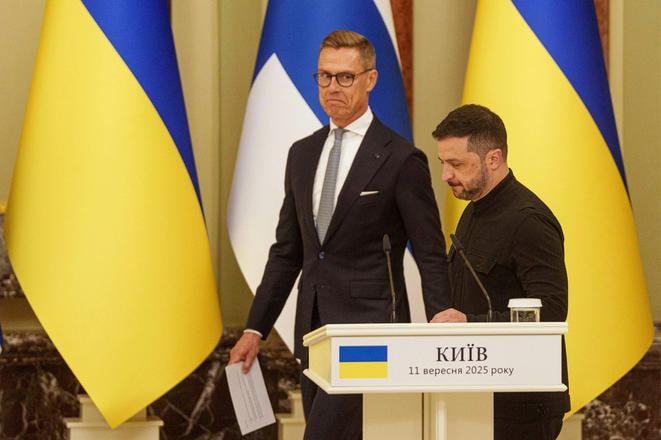Donald Trump has called on NATO and European Union member states to cut themselves off entirely from Russian energy – including Slovakia.
Posting on his social media platform last weekend, the US president said NATO’s commitment to winning the war in Ukraine had been “far less than 100 percent”, and described the purchase of Russian oil by some alliance members as “shocking”.
His comments came after several Russian drones crossed into Polish airspace, in what was seen as an escalation by Moscow against a NATO member. The Slovak government refused to describe Russia as the aggressor in this case, instead calling for an investigation – a stance criticised by Ukraine.
It remains unclear how Slovakia will respond to Trump’s call. The prime minister, Robert Fico, has yet to comment. Fico has previously praised Trump and his efforts to pursue dialogue over Russia’s war in Ukraine. At a conservative conference in Washington earlier this year, the Slovak leader welcomed Trump’s political comeback as “great news”.
Trump’s demand has also been amplified in recent days by senior Republican Senator Lindsey Graham and the US treasury secretary, Scott Bessent.
Writing on X, Graham – a close ally of Trump – singled out Slovakia and Hungary: “When it comes to buying Russian oil, it is now virtually down to Hungary and Slovakia. I hope and expect them to step up to the plate soon to help us end this bloodbath. If not, consequences should and will follow.”
Back in May, Graham had already floated the idea of tariffs of up to 500 percent on imports from countries purchasing Russian energy.
Bessent noted that they are willing to coordinate with Europe on stricter sanctions against Russia, including those aimed at oil firms like Rosneft and Lukoil, but emphasised they will not act independently without European backing.
Slovakia open to non-Russian energy, says minister
While Prime Minister Fico has remained silent on the matter, Economy Minister Denisa Saková of the Hlas party said on 16 September that Slovakia has no objection to importing non-Russian oil and gas, provided there are sufficient transport routes.
Her remarks came in response to Senator Lindsey Graham. Saková said she had raised the issue with the US energy secretary in Vienna earlier in the week, stressing that Bratislava could not simply cut supplies overnight without risking severe damage to its industry and economy.
She noted that Slovakia, once a transit hub, now finds itself at the end of supply pipelines following the closure of routes through Ukraine. The country was working to diversify gas deliveries, she said, but remained reliant on the capacity of neighbouring states’ infrastructure projects.
“The same applies to oil,” Saková added. “If alternative routes such as Adria or southern corridors can provide sufficient capacity, Slovakia and Hungary will have no problem diversifying. The question is whether the necessary infrastructure is in place.”
In April, Czechia, Slovakia’s neighbour, announced it was no longer reliant on Russian oil.
Finland’s Stubb accuses Slovakia of fuelling Russia’s war with energy purchases
Last week, Finland’s president, Alexander Stubb, delivered one of his strongest rebukes yet of fellow EU states, accusing Hungary and Slovakia of “feeding the Russian war machine” by continuing to buy Russian oil and gas.
Speaking in Kyiv on 11 September alongside Ukraine’s president, Volodymyr Zelensky, Stubb said Europe must intensify efforts to choke off Moscow’s revenues as Russia’s full-scale invasion nears its third year, according to Agence France-Presse.
“The crossing of Russian drones into Poland shows Moscow is seeking escalation with NATO,” Stubb told reporters. “As far as getting our own house in order, I think President Trump, when he says that Europe needs to stop buying Russian oil and gas, is right.
“The finger points in two places. One is Hungary and the other is Slovakia. And, of course, we make sure that President Trump is aware of who is feeding the Russian war machine by buying Russian energy.”
Both Hungary’s prime minister, Viktor Orbán, and his Slovak counterpart, Robert Fico, have been vocal critics of EU military aid to Ukraine, repeatedly calling for negotiations with Moscow instead of further military support. Both leaders have also maintained warmer ties with the Kremlin than most of their European peers, frustrating Brussels’ attempts to isolate Vladimir Putin.
Hungary and Slovakia remain the EU states most reliant on Russian oil and gas imports, despite the bloc’s repeated pledges to reduce its dependence. Both Orbán and Fico have travelled to Moscow in recent months for talks with Putin.
EU sanctions delayed amid Slovak resistance
These tensions are now reverberating inside the EU itself. The EU did not unveil its 19th sanctions package on 17 September, reportedly because of objections from Slovakia.
Brussels is expected to shift its focus to Slovakia and Hungary, pressing both countries to reduce their reliance on Russian oil.
Fico’s most recent post on social media, dated 12 September, was directed at the EU: he argued that reforming the Green Deal and saving Europe’s economy should come first, before introducing a 19th round of what he described as “ineffective” sanctions.
The European Commission president, Ursula von der Leyen, has said the next package will be presented “soon”. The EU has set the end of 2027 as the deadline for phasing out all Russian energy products.




